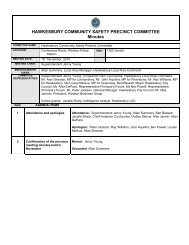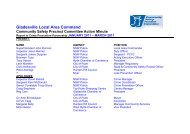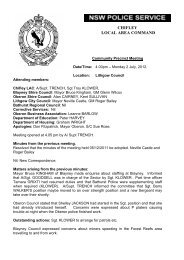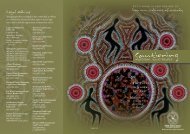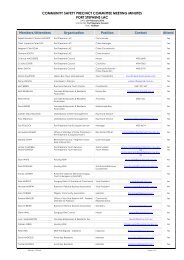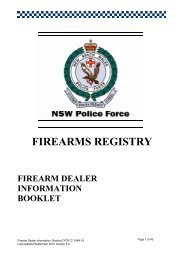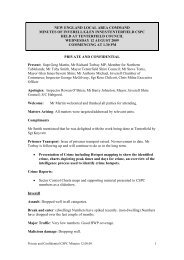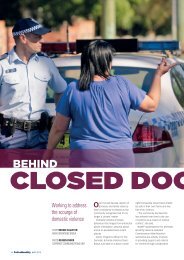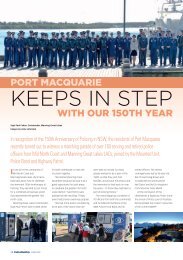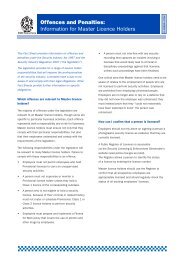Police Monthly May 2013 - NSW Police Force
Police Monthly May 2013 - NSW Police Force
Police Monthly May 2013 - NSW Police Force
You also want an ePaper? Increase the reach of your titles
YUMPU automatically turns print PDFs into web optimized ePapers that Google loves.
ABOVE Mt Druitt LAC’s Domestic & Family Violence Liaison<br />
Officers, Snr Cst Brian Johnson and Sgt David McInerney<br />
working relationships with a range<br />
of government and non-government<br />
agencies.<br />
The DVLO – who is assigned<br />
in each of the 80 LACs in <strong>NSW</strong> –<br />
performs a key role in making this<br />
effective collaboration possible.<br />
Mount Druitt DVLO Coordinator<br />
Sgt David McInerney said the role of<br />
DVLO has a strong focus on<br />
the victim.<br />
“We make sure the victim<br />
understands what might be required<br />
through the court system, we also<br />
put them in contact with various<br />
support services and we do a lot of<br />
victim follow up,” he said.<br />
Sgt McInerney said that working<br />
with victims can however prove<br />
challenging for a number of reasons.<br />
“We have victims who are too<br />
scared to give a statement or<br />
take action, are caught up in their<br />
relationship bond, sometimes it’s a<br />
financial factor,” he said. “Others are<br />
caught in the cycle of violence and<br />
some victims have either a dislike or<br />
cultural fear of police.<br />
RS<br />
“Culturally speaking the fear<br />
is there from a different country<br />
where the police were seen as<br />
an enforcement agency for the<br />
government in a corrupt or violent<br />
way,” he said.<br />
Sgt McInerney said to address<br />
these issues DVLOs work with<br />
external agencies that provide victim<br />
support in different ways.<br />
The Women’s Domestic Violence<br />
Court Advocacy Service (WDVCAS)<br />
for example help female victims<br />
and defendants through the court<br />
process in explaining how the judicial<br />
system works and what power<br />
protection orders have.<br />
Sgt McInerney said Staying Home<br />
Leaving Violence (SHLV) is another<br />
fantastic resource that is of great<br />
benefit to victims of domestic<br />
violence.<br />
“They can provide support by<br />
helping the victim stay at home and<br />
within their own community,” he<br />
said. “It means the family doesn’t<br />
have to uproot their lives and change<br />
everything because the offender has<br />
done the wrong thing.”<br />
Sgt McInerney said SHLV can<br />
provide personal protection alarms,<br />
back to base alarm systems and<br />
motion detecting cameras that help<br />
the victim feel safe and secure.<br />
While DVLOs are victim orientated<br />
they are also sometimes involved<br />
in programs – like the Pacific Island<br />
Perpetrator Program that’s managed<br />
by Mount Druitt Probation & Parole<br />
– that aim to stem the likelihood of<br />
repeat offenders.<br />
Mount Druitt DVLO Snr Cst Brian<br />
Johnson has been involved in the<br />
program for the last three years and<br />
said it’s managed like an open forum<br />
where participants can ask questions<br />
and clarify issues.<br />
“Probation & Parole is a really good<br />
partner agency and I think they are<br />
really proactive in trying to achieve<br />
things,” he said.<br />
DVLOs also develop strategies that<br />
target HROs and often work with<br />
DVOs in carrying out compliance<br />
operations that monitor AVOs as well<br />
as bail conditions.<br />
Sgt McInerney said offender letters<br />
can also be utilised in making the<br />
offender aware that they’re being<br />
proactively targeted, not only for<br />
domestic violence related offences<br />
but any form of criminal behaviour.<br />
“We also focus on consistent victim<br />
follow up in these instances,” he said.<br />
“It becomes more of a managed case<br />
basically – with the victim and<br />
the offender.”<br />
LACs are also involved in event<br />
programs that target younger<br />
demographics, which focus on<br />
breaking the intergenerational cycle<br />
of domestic violence.<br />
Walgett LAC in conjunction with<br />
Mission Australia, Walgett Aboriginal<br />
Medical Service and other local<br />
groups hold ‘Boys Day Out’ and ‘Girls<br />
Night In’ events where teenagers can<br />
discuss relationships, the effects of<br />
drug and alcohol abuse and learn<br />
what resources are available to them<br />
in their community.<br />
DVLO Coordinator for Domestic<br />
& Family Violence Team, Leah<br />
Archer said that breaking the cycle<br />
of violence is always a difficult<br />
challenge.<br />
“As soon as kids realise that<br />
domestic violence is not acceptable,<br />
they’re less likely to commit it,”<br />
she said.<br />
One of the most complex<br />
responsibilities of DVLOs is the role<br />
they play in attending court.<br />
This involves speaking with victims<br />
and offenders, obtaining instructions<br />
on court proceedings and ensuring<br />
that orders and applications are<br />
properly completed and served.<br />
Snr Cst Johnson said everyone<br />
has a purpose and a role at court<br />
despite the fact that they’re all<br />
ultimately working toward the same<br />
common good.<br />
“As police we are incident driven<br />
and based around the law and our<br />
prosecutors work along the<br />
same vain.”<br />
“Court advocacy groups take a<br />
more holistic approach in managing<br />
cases, and legal aid are very<br />
defendant based so their aim is to<br />
get the best result for the defendant,”<br />
he said.<br />
Ms Auld said the judicial system<br />
can also prove trying for DVLOs<br />
when offenders are given perceivably<br />
lenient sentences.<br />
“That is quite difficult for police as<br />
they do all the leg work in attending<br />
a domestic violence incident, they<br />
do the investigation, take photos and<br />
victim statements and attend court,”<br />
she said. “But sometimes from the<br />
police perspective that doesn’t seem<br />
to pay off.”<br />
DVLOs also work with GDs in<br />
reviewing domestic and family<br />
violence reports and cases and<br />
carrying out follow up visits with<br />
victims when necessary.<br />
Sgt McInerney said the GDs<br />
manage the initial domestic incident<br />
in attending the scene, taking<br />
statements, arresting offenders and<br />
applying for an AVO.<br />
Sgt McInerney said the DVLO in<br />
turns acts as an oversight body in<br />
ensuring the incidents are responded<br />
to correctly – which is informed by<br />
their specialist knowledge of the area<br />
regarding SOPs for instance.<br />
“We’re trying to help GDs, not<br />
hinder them,” he said. “Making sure<br />
that everything is done correctly is<br />
part of our job and if we can help<br />
everyone with that as in the victim,<br />
the offender and police, then we’ve<br />
done our job.”<br />
Ms Auld said there’s a lot more<br />
resources, skills, training and<br />
knowledge available to support<br />
police now to carry out proactive<br />
investigations and prosecutions to<br />
ideally achieve better court results.<br />
“We’re lucky to have so many<br />
passionate DVLOs,” she said. “They’re<br />
dealing with victims who may be<br />
crying, angry, scared – the whole<br />
range of emotions – and they have to<br />
find a way to connect with them.”<br />
“It’s a credit to them – regardless<br />
of how long they work in the role –<br />
as it’s a highly emotive, volatile and<br />
dangerous area of work and they<br />
achieve great results.”<br />
MAY <strong>2013</strong> <strong>Police</strong><strong>Monthly</strong> 15



